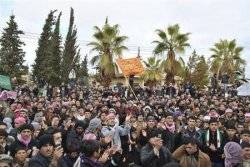The US has said the rule of Syrian President Bashar al-Assad is coming to an end, as Western and Arab nations push for a UN Security Council resolution.
Washington is seeking to convince Russia not to stand in the way of the Arab League's initiative, to be presented to the Security Council in New York on Tuesday, calling for Assad to transfer power to help resolve the crisis.
"Assad's fall is inevitable," Jim Carney, the White House spokesman, said on Monday.
"As governments make decisions about where they stand on this issue and what steps need to be taken with regards to brutality of Assad's regime, it's important to calculate into your consideration the fact that he will go. The regime has lost control of the country and he will eventually fall."
Damascus dismissed Western criticism and said it would defeat what it called foreign attempts to spread chaos.
"We are not surprised at the lack of wisdom or rationality of these statements and regret that they are still issued by
countries that are used to making the Middle East an arena for their follies and failures," the state news agency quoted a foreign ministry source as saying.
"Syria, which is defending itself today against terrorism and will continue to do so, will be the exception which ... will
foil the policies of chaos adopted by these countries," it said.
Violence escalating
The comments came as fighting seemed to escalate on the ground in Syria, where activists said about 100 people were killed on Monday.
Troops battled anti-Assad fighters in the central city of Homs and in suburbs of the capital, Damascus.
The Local Co-ordination Committees said the majority of the victims died in Homs province, many of them in the town of Rastan, where the army shelled residential buildings.
Rastan has long been the scene of battles between armed opposition and government forces.
At the edges of Damascus, fighting subsided by nightfall on Monday as members of the anti-Assad Free Syrian Army (FSA) pulled out to the edges of the capital's suburbs, activists said.
Several civilians and six FSA members were reportedly killed.
Meanwhile, Nabil Elaraby, the secretary-general of the Arab League, and Hamad bin Jassim Al Thani, the Qatari prime minister, held talks with diplomats in New York ahead of Tuesday's Security Council meeting on Syria.
A new draft resolution calls for a "political transition" in Syria. While it does not seek military action or UN sanctions against Syria, it does say that the Security Council could "adopt further measures" if Damascus does not comply with the terms of the resolution.
Russia, which along with China vetoed a previous draft in October, has not explicitly threatened to veto the resolution, but has said the draft is unacceptable in its present form.
Diplomatic muscles flexed
Hillary Clinton, the US secretary of state, said she would travel to the UN for the meeting to "send a clear message of support to the Syrian people: We stand with you".
France, the UK, and Portugal are sending their foreign ministers to take part in the meeting.
A vote on the resolution, drafted by European and Arab members of the council, could come before the end of the week, diplomats say.
"All diplomatic muscles are being flexed here in New York in an attempt to win support for a resolution that is put forward by Morocco in the Security Council... But it comes down to China and Russia who have both expressed concern over the resolution."
As permanent members, both Russia and China have veto powers at the Security Council, so any binding resolution would require Moscow and Beijing to at least abstain from voting.
Earlier, Russia suggested to the government and the opposition that they should meet in the Russian capital for "informal contacts" without any preconditions.
Russia said Assad's government had agreed to talks, but a major opposition body rejected the offer.
"The resignation of Assad is the condition for any negotiation on the transition to a democratic government in Syria," Burhan Ghalioun, head of the opposition Syrian National Council, told the AFP news agency.
PHOTO CAPTION
Demonstrators protest against Syria's President Bashar al-Assad in Jerjenaz, near Idlib January 27, 2012.
Aljazeera


 Home
Home Discover Islam
Discover Islam Quran Recitations
Quran Recitations Lectures
Lectures
 Fatwa
Fatwa Articles
Articles Fiqh
Fiqh E-Books
E-Books Boys & Girls
Boys & Girls  Hajj Rulings
Hajj Rulings Hajj Fatwas
Hajj Fatwas














